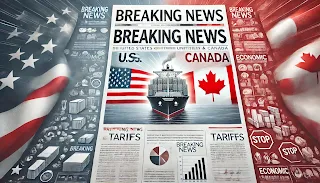Canada Prepares to Respond to Trump’s Threats
Trump accused Canada of contributing to illegal immigration and drug trafficking and hinted at the possibility of annexing Canada as the “51st state” of the United States. Additionally, he mocked outgoing Canadian Prime Minister Justin Trudeau, referring to him as the “Governor of the Great State of Canada.”
While some analysts have dismissed Trump’s comments, Canadian politicians and economists have criticized his remarks. Many were surprised, as Trump had largely refrained from targeting Canada during his campaign, focusing instead on China, Mexico, BRICS, and NATO.
Douglas Porter, Chief Economist at the Bank of Montreal, told DW that Trump’s comments were entirely unexpected. Even among Trump’s supporters, there has been no indication of viewing Canada as an adversary, making the remarks seem particularly troubling.
USMCA Agreement Under Scrutiny
Trump spearheaded the implementation of the United States-Mexico-Canada Agreement (USMCA) in 2020. However, he now claims that Canada and Mexico have failed to meet key terms of the deal, including border control and trade. The agreement is scheduled for review next year.
Tony Stillo, Director of Canada Economics at Oxford Economics, told DW that Trump’s history of reneging on his own agreements to extract more favorable terms is well-known. He cited how Trump replaced NAFTA with the USMCA, only to later call it “the worst deal.”
US-Canada Trade Relations
Trade between Canada and the United States reached nearly $700 billion in the first 11 months of last year. Canada remains the largest market for U.S. exports, surpassing Mexico, Europe, and China. U.S. exports to Canada include trucks, cars, automotive parts, and fossil fuels.
Similarly, over 75% of Canada’s exports are destined for the United States. For comparison, 53% of Germany’s exports go to EU countries. A quarter of Canadian exports to the U.S. are crude oil, with volumes reaching 4.3 million barrels per day in July, according to the U.S. Energy Information Administration.
Refined Canadian oil fuels U.S. demand for gasoline, diesel, and jet fuel, with some of the refined products exported back to Canada. Alberta Premier Danielle Smith warned that imposing tariffs on Canadian goods would harm U.S. oil refineries and force American consumers to pay more at the pump.
Canada’s Countermeasures
In preparation for potential tariffs, Canada is drafting a list of U.S. goods that could face retaliatory tariffs. This includes steel, ceramics, glass, flowers, and Florida orange juice, according to The Globe and Mail.
This isn’t the first trade dispute between the two nations. During Trump’s first term, similar tensions arose but were resolved within a year. However, economists warn that U.S. tariffs could reduce Canada’s GDP by 2-4% and potentially trigger a recession, reports BNN Bloomberg.
As Canada braces for further challenges, the long-standing economic interdependence between the two nations underscores the high stakes of any potential trade conflict.

0 comments:
Post a Comment